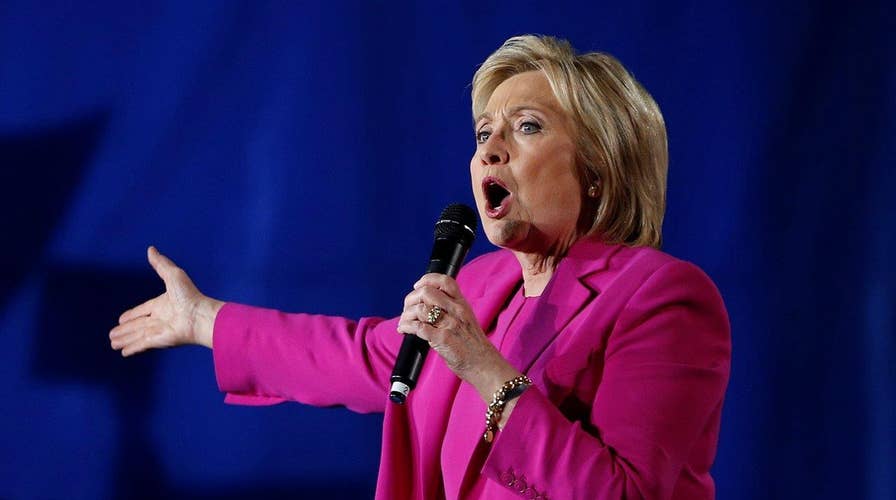Should Hillary Clinton succeed in beating back the Bernie Sanders challenge, don't look for her — or any of the remaining 2016 Republican White House candidates, for that matter — to provide a coattail ride for any congressional hopefuls.
That wasn't the case a year ago, when House Democratic Leader Nancy Pelosi predicted that a Clinton candidacy "would be one that could not only take her into office, but would [pull Democrats to victory].”
But, what a difference a year makes — one filled with FBI investigations into her use of a private email server while secretary of state, questions about foreign contributions made to her family foundation, and Sanders.
All which prompted the National Republican Congressional Committee -- the party’s House campaign arm -- to recently declare Pelosi’s prediction that Clinton would return the Democratic Party to power is “in shambles.”
As evidence that Clinton’s coattails are “fraying,” the NRCC points to her favorability rating falling well below 50 percent, both nationally, and in some congressional swing districts.
“The significant holes in House Democrats' recruiting efforts not only proves that their initial confidence in riding Hillary's coattails is misplaced, but also that they have no hope of recapturing the House majority in 2016,” Katie Martin, communications director for the NRCC, told FoxNews.com.
“Democrats’ top-of-the-ticket options are an untrustworthy Hillary Clinton, who is currently under FBI investigation, or self-described socialist Bernie Sanders. It doesn’t take a bookie in Vegas to know the odds are in our favor in 2016,” Martin said.
The Democratic Congressional Campaign Committee, for its part, is staying positive. Chairman Rep. Ben Ray Lujan, D-N.M., was quoted last fall saying there’s “no question” they’ll gain seats.
A DCCC aide told FoxNews.com on Monday the eventual Democratic nominee “will have a positive, down-ballot impact on House Democratic candidates and incumbents by turning out women, people of color, young people, working families, and others.”
And Robert Jackson, professor of political science at the Florida State University in Tallahassee, said while he doesn’t see any candidate bringing a big coattail effect this cycle, Clinton could offer some measure.
“I think Hillary Clinton might have some potentiality to have some coattail effect if she is pitted against a Republican candidate who can be easily beaten,” he said.
And there’s the rub. Clinton’s coattail effect, if she is the Democrats’ nominee, may depend more on who is the GOP nominee.
The DCCC argues that Donald Trump or Ted Cruz at the top of the ticket would hurt fellow Republican congressional candidates in a general election.
Kyle Kondik, with the University of Virginia Center for Politics, also wrote in Politico last year that with a controversial figure like Trump at the top of the Republican ticket, it could “turn off voters in the districts Democrats need to retake the House.”
Still, he wrote, Democrats’ odds of winning the House majority “are just a couple ticks greater than zero.”
This year, Democrats in the House would need to win 30 seats to reclaim the majority. In the Senate, they would need five. That’s a tough task for any presidential nominee to help with, let alone Clinton or Sanders.
But back in 2008, the popular Barack Obama arguably helped his party make gains on Capitol Hill.
In that election, Democrats upped their majorities in the House and Senate, picking up 21 House seats and eight Senate seats in the process. Similar trends were seen when Ronald Reagan beat Jimmy Carter in 1980. The amiable California governor played a vital role in gaining the Republicans 34 House seats and 12 Senate seats.
This year, Clinton may actually be causing headaches for Senate Democratic candidates, in her effort to blunt Sanders’ criticism of her Wall Street ties.
She has answered those charges by arguing Sanders has taken roughly $200,000 in Wall Street money through the Democratic Senatorial Campaign Committee.
He got that money, directly and indirect, during his successful 2006 Senate run, though only a fraction of DSCC funds came from Wall Street, according to the Center for Responsive Politics.
But the line of attack has spurred news reports about Sanders attending DSCC retreats with high-dollar donors, including one this past summer on Martha's Vineyard that was attended by other Senate Democrats and candidates, from Ohio Senate candidate Ted Strickland to Colorado Sen. Michael Bennet to Kathleen McGinty, a Clinton backer running for a Pennsylvania Senate seat.
Meanwhile, the Democratic nomination battle is far from decided. Thanks to the support of party insiders known as so-called “superdelegates,” Clinton significantly leads Sanders in the early delegate count. And her win in Nevada may help her regain her footing after a narrow Iowa victory and a big New Hampshire loss. But the South Carolina primary this weekend, and the Super Tuesday contests after that, will be a significant test.
David Lublin, a professor of American government and politics at American University in Washington, downplayed the importance of coattails in general, saying “partisanship has hardened” in many districts anyway.
“Many House seats are safe simply because party lines have hardened,” he said.
FoxNews.com’s Adam Shaw, Daniel Jativa and Joseph Weber contributed to this report.

























